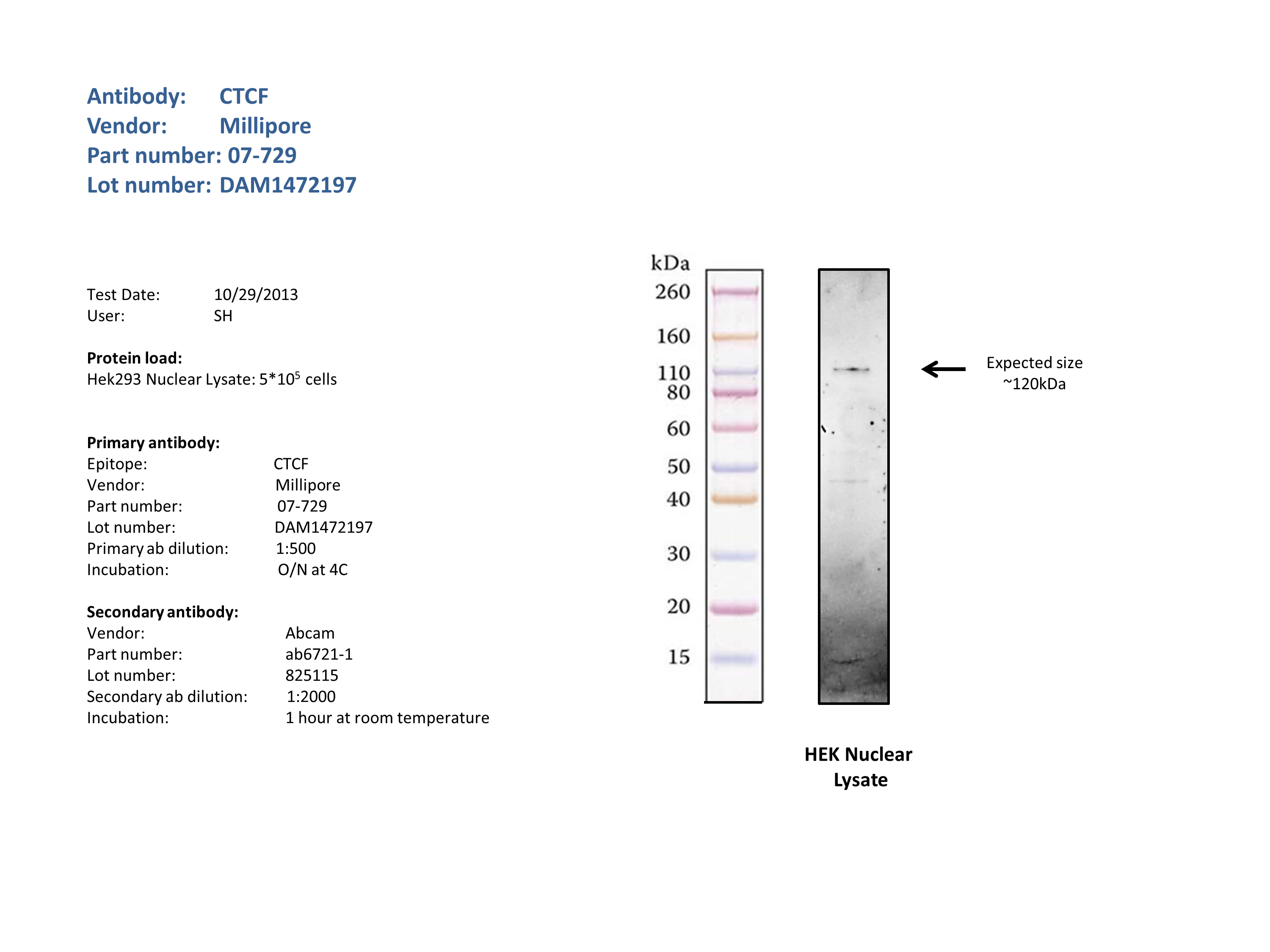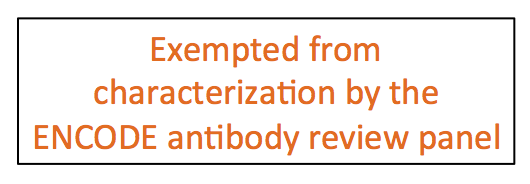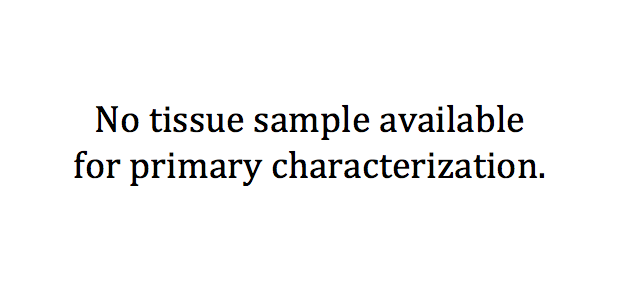ENCAB000AXX
Antibody against Homo sapiens CTCF
Homo sapiens
HEK293, A549, OCI-LY1, MM.1S, MCF-7, K562, DOHH2, bipolar neuron, A673, SK-N-SH, smooth muscle cell, Loucy, fibroblast of arm, myotube, OCI-LY3, cardiac muscle cell, hepatocyte, SU-DHL-6, neutrophil, GM23338, PC-9, PC-3, astrocyte, neural progenitor cell, fibroblast of dermis, KMS-11, NCI-H929, HCT116, OCI-LY7, spleen, stomach, tibial nerve, upper lobe of left lung, uterus, adrenal gland, ascending aorta, gastroesophageal sphincter, Peyer's patch, esophagus muscularis mucosa, prostate gland, right atrium auricular region, gastrocnemius medialis, thyroid gland, GM23248, Karpas-422, coronary artery, vagina, heart left ventricle, testis, parathyroid adenoma, body of pancreas, esophagus squamous epithelium, transverse colon
characterized to standards with exemption
- Status
- released
- Source (vendor)
- Millipore
- Product ID
- 07-729
- Lot ID
- DAM1472197
- Characterized targets
- CTCF (Homo sapiens)
- Host
- rabbit
- Clonality
- polyclonal
- Purification
- crude
- Antigen description
- Raised against KLH-conjugated, synthetic peptide corresponding to amino acids 659-675 ( C-TNQPKQNQPTAIIQVED) of human CCCTC-binding factor (CTCF) with a N-terminal cysteine added for cunjugation purposes
- Antigen sequence
- C-TNQPKQNQPTAIIQVED
- Aliases
- bradley-bernstein:PchAb 51-V
- External resources
Characterizations
CTCF (Homo sapiens)
HEK293
compliant
- Caption
- 5X10e5 cells equivalent of nuclear extract from HEK293 cells, were resolved by electrophoresis on a 4-12% acrylamide gel. After separation, the samples were transferred to a nitrocellulose membrane with an Invitrogen iBlot system. Membrane was blocked for an hour in room temperature, with 5% nonfat dry milk and blotted with primary antibody in the appropriate concentration over night at 4c. Membrane was washed and blotted with secondary HRP-conjugated antibody. Detection was made with Optiblot ECL Detect Kit (ab133406) for 2 min. Band of the expected size was detected (~120kDa), the primary reactive band contains at least 50% of the signal observed on the blot.
- Submitted by
- Noam Shoresh
- Lab
- Bradley Bernstein, Broad
- Grant
- U54HG006991
CTCF (Homo sapiens)
Method: ChIP-seq comparison
exempt from standards
- Caption
- This validation relies on the use of two different antibodies raised against different, non-overlapping peptides, both derived from the sequence of human CTCF, and the discovery of highly correlated patterns of enrichment by ChIP-Seq in K562 cells. The polyclonal antibody being validated (ENCAB000AXX) was raised against a 17 residue long synthetic peptide located 52 residues away from the C-terminus of CTCF. In contrast, the monoclonal antibody (https://www.encodeproject.org/antibodies/ENCAB498PCM/) was raised against a peptide derived from the extreme C-terminus of CTCF. Overall correlation score = 0.976
- Submitter comment
- SAV5
- Reviewer comment
- There is no more antibody to characterize. This method was acceptable for ENCODE2.
- Submitted by
- Nina Farrell
- Lab
- Bradley Bernstein, Broad
- Grant
- U54HG006991
- Download
- CTCF_PchAb_51-V_SAV.pdf
CTCF (Homo sapiens)
A549OCI-LY1MM.1SMCF-7K562DOHH2bipolar neuronA673SK-N-SHsmooth muscle cellLoucyfibroblast of armmyotubeOCI-LY3cardiac muscle cellhepatocyteSU-DHL-6neutrophilGM23338PC-9PC-3astrocyteneural progenitor cellfibroblast of dermisKMS-11NCI-H929HCT116OCI-LY7spleenstomachtibial nerveupper lobe of left lunguterusadrenal glandascending aortagastroesophageal sphincterPeyer's patchesophagus muscularis mucosaprostate glandright atrium auricular regiongastrocnemius medialisthyroid glandGM23248Karpas-422coronary arteryvaginaheart left ventricletestis
exempt from standards
- Caption
- Both ENCODE submitter and reviewer have agreed that this is a well-established antibody lot. Hence it does not require additional validation as standardized by the ENCODE Consortium.
- Submitter comment
- The lab requests that this is considered a well-documented antibody lot and therefore does not require additional validation.
- Reviewer comment
- Dr. Peggy J Farnham: I would support a “no additional validation needed” classification for this antibody.
- Submitted by
- Nina Farrell
- Lab
- Bradley Bernstein, Broad
- Grant
- U54HG006991
- Download
- exempted.png
CTCF (Homo sapiens)
parathyroid adenomabody of pancreasesophagus squamous epitheliumtransverse colon
exempt from standards
- Caption
- The ENCODE Binding Working Group finds for some valuable tissues that recreating a primary on well characterized antibodies is not cost effective. Therefore, they allow exemption from standards for these tissues. Compliant characterizations in other cell lines may be used instead.
- Submitter comment
- --
- Reviewer comment
- --
- Submitted by
- Kathrina Onate
- Lab
- Bradley Bernstein, Broad
- Grant
- U54HG006991
- Download
- No_tissue.png


